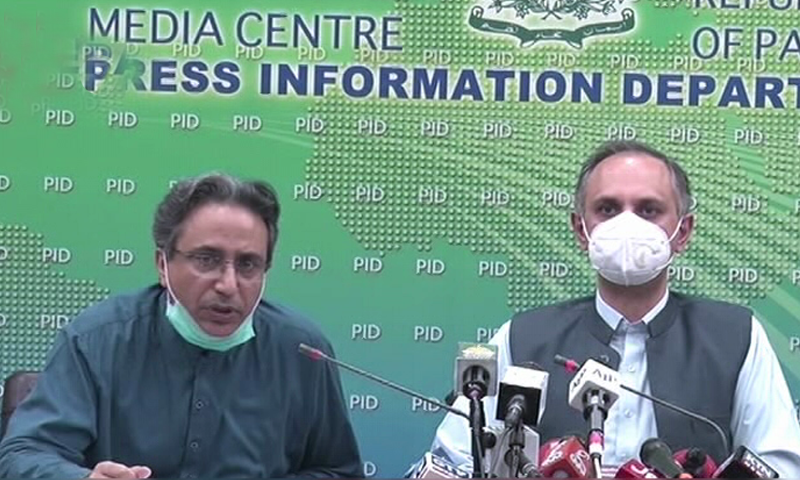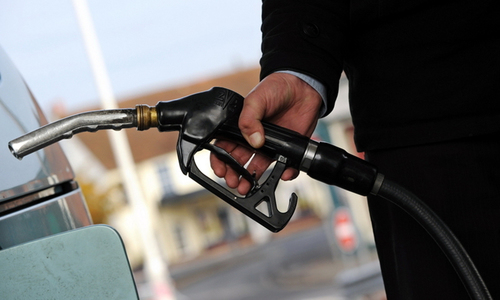ISLAMABAD: Adviser to the Prime Minister on Petroleum Nadeem Babar said on Saturday that there was sufficient evidence to show that oil marketing companies (OMCs) and petrol pump owners were storing oil in the current month while expecting an increase in the prices.
“If we compare the OMC sales figures in the first 10 days of June this year it was 52 per cent higher than the same period of last year and the average sales till today was around 32-33pc higher than that of June 2019,” he said, adding it was not possible that consumption had jacked up significantly over last year.
“This means that a major part of oil was going towards hoarding,” Mr Babar said while addressing a press briefing with federal Minister for Power and Petroleum Omar Ayub Khan.
The adviser said that oil prices were rapidly rising at the international markets but were significantly low in Pakistan and therefore the OMCs and the dealers were maintaining stocks to make inventory gains.
“We need to devise policies to contain such manipulations in future and the government is working on structural changes to streamline the supply chain and strengthen the regulator to enable it to implement the rules,” he said.
Nadeem says petrol is being sold at Rs100 per litre in Pakistan while its price in Bangladesh and China is Rs138 or more
The three main reforms in this regards were shutdown of illegal petrol stations and storage depots, implementing automation systems at storage depots of oil companies and at the points of sale (petrol pumps) too so that live sales data might be available to the Oil and Gas Regulatory Authority (Ogra), he said.
While Mr Babar acknowledged that the regulator was not powerful enough to enforce its decisions and that the solutions of similar crises in future was to strengthen Ogra and empower it to suspend the operational licence of any oil company if it continued to violate the terms of its licence.
He said that OMCs were not fulfilling the requirements to maintain 21 days of stocks of their average sales and strict measures were required to implement this requirement.
He said there was a need to upgrade laws and rules to enhance the penalties and fines imposed on the OMCs for such violations. “Currently the penalties imposed on the OMCs were actually peanuts.”
Mr Babar said that automation of supply chain was essential as even the OMCs did not have updated data of sales by their petrol pumps.
“There are around 9,000 legal petrol pumps and around 1,500 illegal petrol stations and these illegal pumps are also used as storage dumps,” he said. “We have taken the list of all registered petrol pumps from the OMCs and given it to the district administrations in each province.”
He said that an initial report had been received from Khyber Pakhtunkhwa where out of about 400 reported illegal stations 60 to 70 had been sealed.
Mr Babar said that it was observed that the OMCs were not selling stocks from their depots and it was an unfair business practice.
“The automation of in and out supplies at oil depots will be completed in 30 days while the same at 9,000 petrol stations will take a few months,” the adviser said.
He said that refining capacity of the country could only cater to 35-40pc of national needs.
“The problem is that our refineries are very old and their cost of production is too high. They need to be upgraded or closed down,” Mr Babar said, adding that the refineries had been directed to provide their up-gradation plans to the government by September this year.
Petroleum Minister Khan said that petrol prices had increased due to rise in the international oil prices and rupee-dollar parity but despite the fresh price hike, fuel prices in Pakistan were lower than those of other Asian countries.
He said that Pakistan did not have its own oil resources and international prices had increased by 48pc and more recently by 112pc.
He said that petrol was being sold at the rate of Rs100 per litre in Pakistan while its price in Bangladesh and China was Rs138 or more. The prices are even higher in Japan and the Philippines.
The minister said that on Jan 1, petrol was selling for Rs116.07 per litre and compared to this, today’s price was still cheaper by Rs16 and that of diesel cheaper by Rs26.
“As soon as the prices of petroleum products fell in the international market, we reduced them. We did not impose any new tax on petroleum products. The government believes that the process will go through fluctuations,” he said.
The minister said that recently the power division had held a meeting with the MNAs from Karachi and the management of K-Electric. “The problem is that K-E has to develop and upgrade its internal system.”
It was the responsibility of KE to provide relief to the people of Karachi, he said, adding that the company had been fined by Nepra in the past.
“They need to resolve their own problems, but I cannot comment on the internal issues of K-Electric as it is not under me,” the minister said.
He said that the KE was getting 850MW from the national grid and it had to manage the rest of power requirements on its own and needed to revisit its generation capacity.
The electricity requirement of Karachi was increasing and it had been decided that additional power would be supplied for domestic, commercial and industrial consumers of the city by 2022-23, Mr Ayub said.
“But K-Electric has to establish 550 KVA grid stations to get this additional power supply and it needs to start work now as it takes around two years to complete these grid stations,” he said.
Published in Dawn, June 28th, 2020
















































